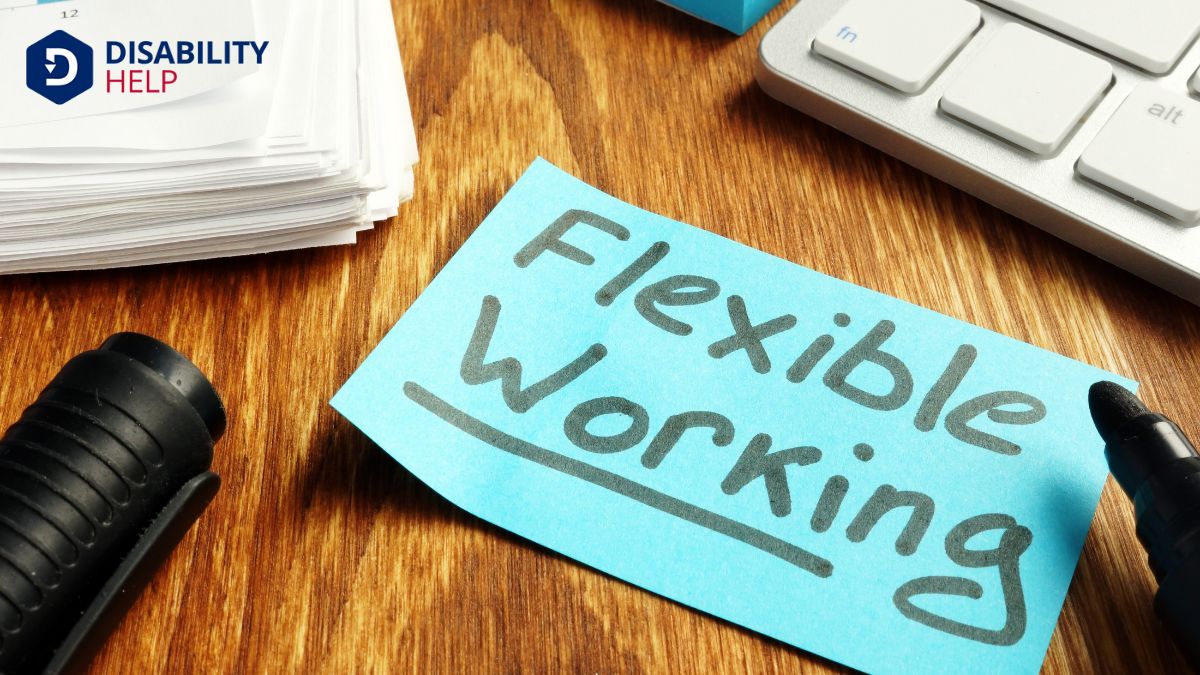Flexible work arrangementsWork schedules that allow employees with disabilities to manage their health and job responsibilitie... positively impact mental health by reducing stress and enhancing work-life balanceThe equilibrium between personal life and work, which may require special considerations for employe.... Tailored schedules let us better manage responsibilities and personal time, minimizing distractions and boosting productivity. However, these benefits come with challenges like the risk of blurred work-life boundaries and isolation. By setting boundaries and prioritizing social interactions, we maintain our well-being. There's more to discover about maneuvering these flexible environments to enhance our mental and emotional health.
Key Takeaways
- Flexible work arrangements can reduce stress by allowing personalized schedules and comfortable work environments.
- They enhance work-life balance, contributing to improved mental well-being and job satisfaction.
- The blurred lines between work and personal life in remote settings can increase stress and feelings of isolation.
- Establishing boundaries and maintaining social interactions are crucial to prevent negative mental health impacts.
- Strategic time management and regular breaks help prevent burnout and promote mental health.
Understanding Flexible Work Arrangements

Flexible work arrangements, though increasingly popular, often leave us wondering about their true nature and implications.
At its core, flexible work allows us to tailor our professional lives to better fit our personal circumstances. We might encounter terms like remote work, flextime, job sharing, and compressed workweeks.
Each offers a unique way to break away from the traditional 9-to-5 office setting.
The Benefits of Flexibility for Mental Well-Being
When we embrace flexible work, we often find that our stress levels decrease because we can tailor our schedules to our needs.
This adaptability also allows us to maintain a healthier balance between work and personal life, giving us more time for self-care and family.
Reduced Stress Levels
As we navigate the evolving landscape of work, the benefits of flexible work arrangements have become increasingly clear, particularly in reducing stress levels.
When we've control over our schedules, we can tailor our work hours to suit our personal needs, lessening the pressure of rigid timelines. This flexibility allows us to avoid peak commute times, reducing the stress of traffic congestion and long hours on the road.
Additionally, flexible arrangements let us create a comfortable work environment, minimizing distractions and promoting focus. By reducing these daily stressors, we can engage in work with a clearer mind and improved mental well-being.
Ultimately, when stress is managed, our productivity and overall satisfaction with work can greatly increase, benefiting both individuals and organizations.
Improved Work-Life Balance
While reduced stress levels are a significant advantage, another compelling benefit of flexible work arrangements is the improved work-life balance they offer.
When we've control over our schedules, we can better align work commitments with personal responsibilities. This means we can attend family events, pursue hobbies, or simply take a moment to recharge without the guilt that often accompanies rigid work hours.
Remote Work and Its Psychological Impacts
Remote work has transformed our daily routines, bringing both advantages and challenges for our mental well-being.
When we work from home, we might appreciate the flexibility and the elimination of long commutes. This can lead to increased productivity and more time for personal activities.
However, working remotely can also blur the lines between our professional and personal lives, potentially causing stress and burnout.
Without a clear division between work and home, it’s easy to overwork or feel isolated. We lose out on the spontaneous interactions with colleagues that often boost morale.
To maintain our mental health, it’s essential to establish boundaries, take regular breaks, and stay connected with our team.
Let’s embrace the positives while addressing the challenges of remote work.
Navigating the Challenges of Compressed Workweeks
Although the idea of compressed workweeks often sounds appealing, it comes with its own set of challenges that we must navigate carefully. Working longer hours in fewer days can lead to fatigue and burnout if we’re not mindful.
We need to guarantee we’re maintaining a healthy work-life balance, which might mean setting boundaries and taking regular breaks to recharge.
Additionally, communication can become a hurdle when teams aren’t available every day. We must plan strategically, guaranteeing that collaboration doesn’t suffer.
By effectively managing our time and setting clear expectations with colleagues, we can minimize potential stressors.
Let’s remember that while a compressed schedule offers the allure of more free days, it requires deliberate effort to balance the demands of our personal and professional lives.
The Role of Job-Sharing in Stress Reduction
Job-sharing presents an innovative solution for reducing stress in the workplace. By splitting responsibilities between two individuals, we can tackle our tasks more efficiently and with less pressure.
Here’s how job-sharing can help reduce stress:
- Shared Responsibilities: We distribute the workload, which lowers individual stress and allows for more focused, quality work.
- Increased Flexibility: By sharing a role, we can adjust our schedules, making it easier to manage personal commitments alongside professional duties.
- Better Work-Life Balance: Job-sharing offers more time for personal activities, which contributes to overall well-being.
- Enhanced Problem Solving: With two minds collaborating on the same tasks, we can approach challenges more creatively and efficiently.
Balancing Work and Home Life in a Blended Environment
As we navigate the blended environments of work and home, managing our time effectively becomes essential.
We need to set clear boundaries to guarantee that work doesn’t spill over into personal life.
Let’s remember to prioritize self-care practices to maintain our mental health amidst these blurred lines.
Managing Time Effectively
In today's blended work environments, effectively managing our time is essential for maintaining balance between professional responsibilities and personal life.
With the lines between work and home often blurred, we must prioritize our tasks carefully to avoid feeling overwhelmed.
Here are a few strategies to help us maintain this balance:
- Prioritize tasks: Focus on what's urgent and important to tackle first, reducing stress and increasing productivity.
- Schedule breaks: Regular breaks help recharge our energy, enhancing overall efficiency and mental well-being.
- Create a routine: Establishing a consistent schedule helps us manage our day effectively and sets clear expectations.
- Use tools: Consider digital tools like calendars and task managers to streamline our responsibilities and keep track of deadlines.
Setting Boundaries Clearly
While flexible work arrangements offer numerous benefits, setting clear boundaries between work and home life is essential to maintain our mental well-being.
We often find ourselves answering emails late at night or taking work calls during family time, blurring the lines between our professional and personal spaces.
To prevent burnout and stress, we need to establish defined work hours and communicate these times to our colleagues and family.
It’s vital to create a dedicated workspace that signals to our minds when it’s time to work and when it’s time to relax.
Let’s also remember to unplug from digital devices at the end of the workday.
Prioritizing Self-Care Practices
Though the lines between work and home can often blur in a flexible work environment, prioritizing self-care is essential to maintain our well-being.
When we consciously integrate self-care into our daily routine, we support our mental health and create a balanced life. It’s vital to find activities that recharge us and fit seamlessly into our schedules.
Here are some practical self-care practices:
- Set boundaries: Define clear work hours to separate professional tasks from personal time.
- Take breaks: Step away from work regularly to refresh your mind and reduce stress.
- Engage in hobbies: Dedicate time to activities that bring us joy and relaxation.
- Practice mindfulness: Incorporate meditation or deep-breathing exercises to enhance mental clarity.
Addressing the Risks of Isolation and Loneliness
How often do we find ourselves working from home, only to realize we haven't spoken to anyone all day? It's easy for isolation and loneliness to creep in when our work environment shifts from bustling offices to quiet homes.
As we embrace flexible work arrangements, we mustn't overlook the importance of social interaction for our mental well-being. Without regular face-to-face interactions, we risk feeling disconnected, impacting our mood and productivity.
We need to recognize these risks and actively seek out connections, whether through video calls, social media, or community groups. Creating small moments of engagement can make a significant difference.
Let's remind ourselves that while flexibility offers freedom, maintaining strong social bonds is essential for a balanced and healthy work-life experience.
Strategies for Enhancing Mental Health in Flexible Work Settings

Recognizing the potential pitfalls of isolation in flexible work, we can implement effective strategies to enhance mental health.
Maintaining our well-being in these settings requires intention and action. Let's explore practical steps together:
- Establish Routine: Creating a consistent daily schedule helps set boundaries and provides structure, which is essential for mental stability.
- Leverage Technology: Utilize video calls and chat platforms to stay connected with colleagues, fostering a sense of belonging and reducing feelings of loneliness.
- Designate Workspaces: Having a dedicated work area helps separate professional and personal life, reducing stress and enhancing focus.
- Regular Breaks: Incorporate short breaks to recharge mentally and physically, preventing burnout and improving productivity.
Conclusion
In exploring flexible work arrangements, we've seen how they can greatly enhance our mental well-being. By embracing remote work, compressed schedules, and job-sharing, we're better equipped to balance our personal and professional lives. However, we must remain vigilant about the risks of isolation and loneliness. Let's continue to harness these strategies to support our mental health, ensuring we create a supportive and productive environment that benefits everyone. Together, we can thrive in this new work landscape.






